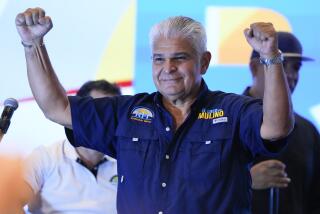Elections Would Fulfill the Panama Mandate
- Share via
Panama needed a revolution; it got an invasion. Fortunately it is simple to transform the aftermath of this invasion into a democratic revolution, overcoming divisions in the hemisphere and placing democracy on a firmer footing.
People may have forgotten on this side of the world what democratic revolutions look like; we have not experienced them for some time. In a democratic revolution, when the previous government is ousted, a provisional government takes over to establish a democratic and constitutional order.
Obviously the invasion of Panama was not a revolution. But to achieve undisputed democratic political legitimacy, the new government of Panama would not do better than to follow, as closely as possible, the pattern of a democratic revolution.
Unfortunately the Endara government insists that it is the constitutional government of Panama, based on the elections disrupted by Manuel Noriega on May 7, 1989, and that democratic rule in Panama does not need validation.
But it is difficult to restore democracy while ignoring the fact that the government took office thanks to a military operation. The nationality of the operation is irrelevant to the point: Democracy cannot be restored with the barrel of a gun, even if Panamanians had been holding the guns.
The decision of democratic revolutionaries to recognize political authorities does not confer constitutional legality; it only confers a mandate to establish democracy, a fact that the Sandinistas forgot 10 years ago.
Within the terms of its mandate, a provisional government of Panama can set its own course: choosing to hold new elections or a referendum on the validity of the elections of May 7, 1989.
And it could set a date for an inauguration and invite everyone to a party, which might be as happy and unifying event as the inauguration of the new democratic government in Chile will be next month.
By not proceeding in this way, the new government of Panama has run into difficulties as Latin American governments withhold their diplomatic recognition. But the real threat to Panama is not the lack of Latin recognition, but the strength of the legitimacy of the government in the eyes of its own people. Although support is high now, it is bound to be challenged in the future.
By holding new elections, or a referendum, the Panamanian people would establish a constitutional and democratic government whose legitimacy will be irreproachable. That is how invasions are made into revolutions.
More to Read
Sign up for Essential California
The most important California stories and recommendations in your inbox every morning.
You may occasionally receive promotional content from the Los Angeles Times.













